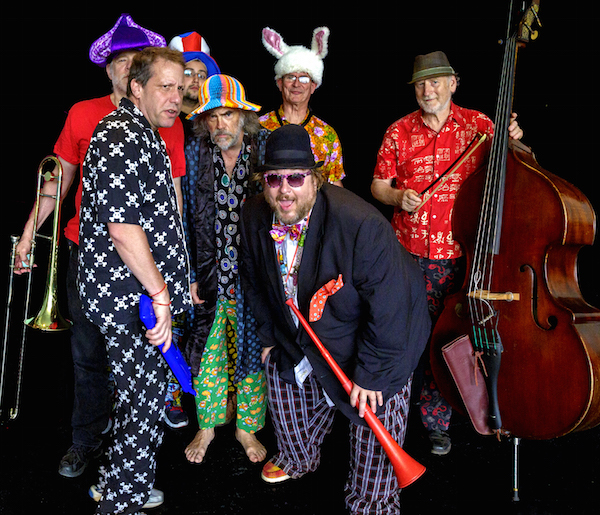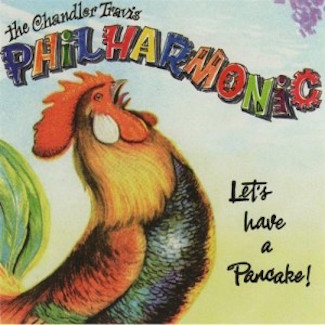Music Feature: The Chandler Travis Philharmonic Blows — a Conversation with Chandler Travis
There’s nothing quite like a Chandler Travis Philharmonic show. “Omni-pop” it’s been called, and that almost does it, except some of the stuff’s not pop at all.

Chandler Travis Philharmonic (l-r): Bob Pilkington, Cliff Spencer, Matt Joseph, Chandler Travis, Fred Boak, Berke McKelvey, and John Clark. Photo: Cliff Spencer.
By Chris Walsh
On occasional Sunday afternoons this spring, a bunch of extraordinary musicians have been making some extraordinary music at the Midway, a small bar in Jamaica Plain. There were nine at the show I saw. Among them were mandolin/guitar/accordion player Dinty Child of Session Americana fame; trombonist Bob Pilkington and saxophonist/clarinetist/everything else-ist Berke McKelvey, both professors of the Berklee School of Music; keyboardist Cliff Spencer; drummer Jerome Deupree, also known for his work with Morphine and, these days, Vapors of Morphine; trumpeter Jon Fraser; and vocalist and vuvuzelaist, Fred Boak, who is also valet to the leader of the band, Chandler Travis. All were wearing bathrobes. Travis was also barefoot. This is the Chandler Travis Philharmonic.
It is truly difficult to describe the music that followed. “Omni-pop” it’s been called, and that almost does it, except some of the stuff’s not pop at all. A reviewer for the New Yorker said the Philharmonic “mixes mind-bending wordplay with Dixieland jazz, shimmering rock, and horn-fuelled R. & B.” But they do cabaret and a Gregorian chant sort of number, too, and some audience participation bits as well. All this is a way of saying there’s nothing quite like a Chandler Travis Philharmonic show.
Travis has also made lots of lovely music on his own as a “Writer-Songsinger” as one of his solo albums was called, in addition to being a founding member of The Incredible Casuals, not to mention the Catbirds and the Chandler Travis Three-O, and he has appeared with Elvis Costello, Green Day, Bruce Springsteen and the E Street Band, John Cale, Bonnie Raitt, NRBQ, Charles Mingus, the Beach Boys, the Replacements, George Carlin, and many other acts. But when we chatted recently through the miracle of Googledocs, it was the Philharmonic that was the main topic.
Arts Fuse: What’s it like putting a Philharmonic show together? Rehearsing? There are so many moving parts, so many different musicians, so many songs, and all so different. How does that work?
Chandler Travis: It varies from no problem at all (when there’s just no time to do anything anyway) to completely exhausting (when I get completely carried away and decide to add five new songs and there’s more than one new guy). I love rehearsing, maybe even more than actually playing as long as we’re working on new stuff, but some of my colleagues either don’t like rehearsing as much as I do, and/or live too far away, and/or are too busy trying to earn a living to do much rehearsing, so sometimes it happens, sometimes not. Frequently I rehearse with whoever’s available — very rarely with the whole band at once. Which sometimes works better than others, arranging around people who aren’t there, but it’s a fascinating puzzle.
You saw Jerry Deupree’s second gig with us, I think; he’s since had a few more gigs and rehearsals, and he’s been terrific and is getting terrific-er all the time, which is lucky not only because the drummer’s probably the single most important guy, but because he’s got some large high heels to fill, in that his predecessor, Rikki Bates, was (and is) so amazing. But Jerome’s been fab, as has our other stalwart at the drum position, Slammy Wood. Lotta work breaking in a new drummer, as we do about 8 zillion songs, and sometimes have different concerns from other bands (such as drummer must be silly, comfortable playing both very loud and very soft, and occasionally play a solo without actually hitting any of his or her drums.)
AF: The musicians are great, and your arrangements give them ample opportunity to show their stuff—but things don’t turn into a solo-fest, which is a good thing, in my book. It feels to me like the song rules. Do you feel that way? Do you have some guiding principle?
Travis: Yes, absolutely, and no, not really, outside of my mantra, which is, at its simplest, less notes, more dynamics, please.
AF: What do you mean by that, for the lay listener? What are “dynamics”?
Travis: Operating at a variety of volumes, ranging from reallyreallyreally soft to fucking loud, the better to both lull listeners to sleep and jar them awake.
AF: Jarring them awake, you say. Occasionally you have some of what a friend of mine calls “fuck-you songs” (though he wasn’t talking about you!) —”Hello Dolly McGee,” “E” (when the band plays an E chord, and sings “E” until a hat passed for tips becomes sufficiently full), or “French Toast Man” (a fuck-you song for kids!). (Curiously, “Shut Up” is not a fuck-you song, though it does shut people up.) Maybe “fuck-you songs” is a little harsh—but I’m remembering your saying that your wife mentioned how one of your albums—was it “After She Left”?—was unique in not having a single song that irritated her. What’s your thinking on this?

Chandler Travis. Photo: Rowland Scherman.
Travis: I guess that’s true, but they make up a very small percentage of my catalog. Oddly, they’re usually relatively popular, albeit not with my wife; apparently people kind of like being told to fuck off every now and then when they’re not married to me, so, you know, good therapeutic fun all around!
AF: They’re not fuck-you songs, come to think of it. They’re fuck-with-you songs. The ridiculous that makes the sublime sublimer, like Fred’s perfect backing vocals on “Bocce and Bourbon” or the transcendent “I’m Chandler’s Butterfly” or “Not Unhappy.” So maybe there are dynamics between notes and between songs too. And you’ve got a lot of songs—how many, exactly? And how many of those does the CTP play? How do you decide on set-lists, working in crowd-pleasers like “Nature Boy” and “Bob Whatsisname” with the more experimental stuff?
Travis: I don’t know… certainly a few hundred. I heard Prince say he’d written a thousand; that’s a lot of songs. The Philharmonic and the Three-O both both have similar repertoires, maybe two hundred songs or so in various degrees of readiness, mostly original. The Casuals had another one or two hundred, I guess, without much crossover; the Catbirds have a little bundle, too, maybe 50 or so of mine, tops, I’d guess. Then solo songs, recordings… hmmm… about an album or so a year for about 50 years, maybe, so 50 times 12, maybe roughly around 600; I’ll bet Prince was full of shit. Plus, if the songs suck (and some of them definitely do, in both cases, much as I love and mourn His Royal Purpleness), who cares? Of course, I’ll kick his little purple ass now that he’s virtually conceded so early…
I mostly don’t make out sets, and lean on whatever’s new. I like making out sets too much, and frequently take as long making one out as I do playing it, especially if there’s been a long drive involved. The farther I am from home, the more likely I am to make out a set.
AF: What about a song makes you wanna do a cover of it? From “Life is Complicated” (Kinks) and “I Wanna Walk You Home” (Fats Domino) to “Right Back Where We Started From” (Maxine Nightingale—had to Google that one!) and what’s the NRBQ one you’ve been doing lately, when the whole band comes down off the stage?
Travis: That’s “Things To You” written by Terry Adams, and that’s a very rare thing, a song so fascinating, soulful, and gorgeous that I literally never get tired of playing it, absolutely happy to play that pretty much every chance I get (and I speak as a person who absolutely gets tired of stuff all the time, and hates to repeat stuff too much.) That song is completely astounding and untoppable, an amazing piece of work.
Jeese, could be anything… Hmmm… Could be a song so fantastic or one so inane you’ve just got to do it, or one so obscure—a lot of times its that same urge as wanting to play a record for a friend… Sometimes it’s just a rhythm that sounds like it’ll be fun to play, or an idea for a radical re-arrangement… Could be anything, really.

AF: Last month you played at Johnny D’s—one of the last shows before it closed down. (Here’s a video of Johnny D’s owner Carla DeLellis saying goodbye in Davis Square) You’ve played there for many years, most famously at the yearly Christmas Cavalcades. Are there fewer venues now, what with TT the Bears closing too—or is this a sort of churn, with some places closing and others opening? The Midway, where you hadn’t played for years, is still there—and they seem to have added space.
Travis: Well, you know, Johnny D’s was a good ol’ joint—rare for a bar to be so well-appreciated in anything other than retrospect, I think everyone had a good time sending them off, and of course Carla, who picked up the baton from her folks and ran the place, was special. Even the much vaunted Rat wasn’t as revered in its lifetime, that was really something, I doubt we’ll see another sendoff like that anytime soon. The Midway, of course, also has a majesty all its own—again, great owners, and a certain dumpy perfection all its own —we’ve absolutely loved being back there, and were kind of shocked at how delightful the reception has been, very gratifying.
Generally thinking, I think there’s still lots of places to play, but I think people got so overdosed with music over the last decades that they just don’t care as much as they used to. Or maybe we just got boring and dropped the ball, I don’t know. I certainly feel very lucky that I happened to be doing this when there was that odd aberration when so many listened so intently in the 60s, 70s and 80s—hell, for a while there, musicians actually had some hope of making a living—what a riot!
AF: Is there a new venue for the Boston Cavalcade this coming year, or do you want to put the word out via Arts Fuse that this worthy enterprise, which raised over $10,000 for Somerville Homeless Coalition last year, is itself in need of a home?
Travis: No new venue so far, haven’t even started thinking about it much, been totally in denial, but have to soon, yes, PLEASE, by all means, if you know where the Cavalcade should happen next year, I’m all ears, help!
AF: You’ve put out albums such as The Chandler Travis Philharmonic Blows and, with the Incredible Casuals, There Goes Five Dollars. You once had a CD launch at a Bickford’s on a Thursday morning. It’s true the album was called Let’s Have a Pancake, but sales among the senior citizens whose breakfasts you interrupted were less than brisk. After that came Llama Rhymes, described on your website as “The CTP 2003 model… with more songs, more musicians, bigger sets, more lavish costumes… why, it’s positively bloated with pure quality and prairie goodness, not to mention guest star appearances from Boston-area favorites Bleu, Ramona Silver, and Suzi Lee; NRBQ’s Johnny Spampinato; and even George Carlin (famous comedian!) A true, deep, lasting piece of art that you’re damn lucky to even be reading about! Jesus!!” Tell us about your marketing principles.
Travis: “Tell us about your marketing principles”? Really?!? Gee, that’s a new one.
No.
AF: Maybe we should end the interview on that abrupt and negative note. Daughter #1 just asked to use the computer “for my homework.”
Travis: I wouldn’t trust her as far as you can throw her.
Upcoming shows featuring Chandler Travis include:
Chandler Travis Three-O, May 19, O’Shea’s Olde Inne (West Dennis, MA)
Chandler Travis Philharmonic, May 22, Midway Cafe (Jamaica Plain, MA)
Chandler Travis Philharmonic, June 4, The Spire Center for the Performing Arts, (Plymouth, MA)
Chandler Travis Three-O, June 8, Harvest Gallery Wine Bar, (Dennis, MA )
Chandler Travis Philharmonic June 10, Hangar (Troy, NY)
Chandler Travis Philharmonic June 11 (afternoon show), Luthier’s Co-op (Easthampton, MA)
Chandler Travis Philharmonic Jun 11, Dockside (South Hadley, MA)
Here for more details and more shows
Chris Walsh’s book Cowardice: A Brief History (Princeton University Press, 2014) is coming out in paperback later this year. Previously for the Arts Fuse, he reviewed Dollhouse, the novel by Kim, Kourtney, and Khloe Kardashian.
Tagged: Berke McKelvey, Bob Pilkington, Chandler Travis, Chandler Travis Philharmonic, Chris Walsh, Cliff Spencer, Fred Boak, John Clark
